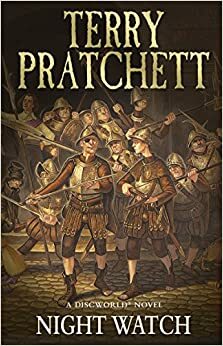
This is part of the Pratchett Project.
The blurb:
For a policeman, there can be few things worse than a serial killer at loose in your city. Except, perhaps, a serial killer who targets coppers, and a city on the brink of bloody revolution. The people have found their voice at last, the flags and barricades are rising... And the question for a policeman, an officer of the law, a defender of the peace, is: Are you with them, or are you against them?
I think I've found my favourite Discworld novel — so far, at least. Another may overtake it, I'm still not finished with reading all of them, but if anything beats Night Watch, it's going to have to be really special.
The plot in a nutshell: it's one day in May, with the lilacs in bloom, and Sam Vimes and the Watch are in pursuit of a serial killer named Carcer, who's now killed a watchman (echoes of Guards! Guards!, where we open on Vimes, drunk in a gutter, mourning Herbert 'Leggy' Gaskin, and having a pretty good existential crisis — his reaction in Night Watch is entirely different). In pursuit, Vimes gets a bit too near Unseen University and a combination of lightning and magic send him back in time to 33 years ago, when Ankh-Morpork was on the verge of revolution against Lord Winder, the then-Patrician, and a young copper named Samuel Vimes was just getting his start in the Watch.
Unfortunately, Carcer has also been sent back in time and he's no less a psychopath in the past. He kills John Keel, then-Sam's mentor in the Watch; now-Sam takes on the Keel identity and his role as new sergeant at arms for the Treacle Mine Road watch house. The History Monks are involved, telling Sam that he can't return to the present until they've cleaned up the timeline and he has fulfilled John Keel's original role in the upcoming Glorious Revolution.
The trouble is, Sam remembers the Glorious Revolution, and John Keel died in it. If he dies, then he doesn't go home again, obviously. So he has a choice — whether or not to be Keel, or to reshape history, save lives in the Revolution and maybe never see Sybil and the modern Ankh-Morpork again.
This one really hit for me in so many ways. We get to see young Sam Vimes, young Nobby, younger Fred Colon and so on, but more importantly, we get to see Vimes-as-Keeler making a fundamental difference to policing in Ankh-Morpork, and to his younger self. He refuses to let the Watch arm themselves in the face of civil unrest. When mobs form and start destroying watch houses, he goes outside and engages in some light banter with the mob. No violence, no arrests and no destruction. He tackles the illegal arrests and torture by the Unmentionables, Lord Winder's secret police force. In a lot of ways, this is the darkest Discworld novel I've read so far, but it's also the one where the light shines the most strongly, simply because Vimes will not give in to his baser nature. He knows all cops are bastards, he knows that he is most emphatically a bastard, and he's disturbed by having power over others. But he has a moral code, even if it's one he has a hard time explaining to himself (see his conversation with A.E. Pessimal in Thud!, up next in the Watch series), and one that depends a lot on him keeping control of himself.
I think Robert Peel (the name Keel is no coincidence — and in later books, we find out that Ankh-Morpork-trained coppers are in demand in other cities, and are nicknamed 'Sammies' in the same way that Roundworld London police were nicknamed 'Peelers' or 'Bobbies' after Robert Peel) would look at Vimes with some approval. I've often wondered what would happen if a police force ever actually lived up to Peel's original principles. Sam Vimes would probably look at them and find them pretty sound, I think.
The Glorious Revolution still happens but not in the same way as Vimes remembers. In particular, Vimes uses the tactic of showing people on both sides of the conflict that the police and the public are the same thing — most of the watch are known to revolutionaries and vice versa, and it's a lot harder to assault someone when you know your mum will have your hide for it. Vimes has, since we first met him, become a leader, someone who's self-aware enough and intelligent enough to be a good one, too.
It's a remarkable book, and one everyone should read. The theme around the ethics of policing and of revolution are examined deeply without becoming a polemic. The characters are deeply human, flaws and all, and it's a remarkable piece of storytelling.
Started: 16 April 2025
Finished: 18 April 2025
Back home.
More books.
More from the Pratchett Project.